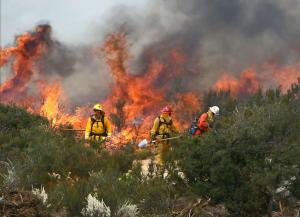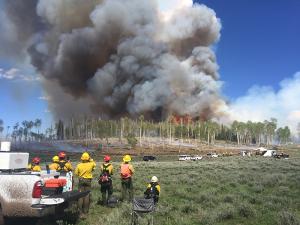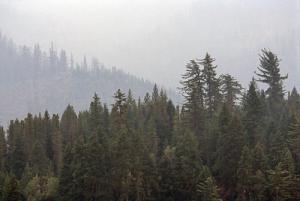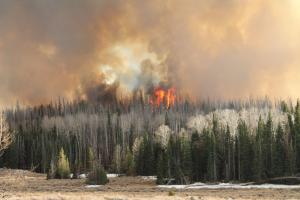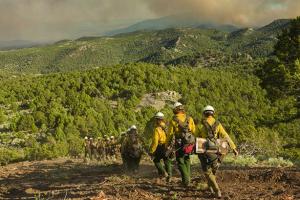Brian Potter

Research Meteorologist
400 N 34th St., Suite 201
Seattle, WA 98103-8600
United States
Seattle, WA 98103-8600
United States
Phone
206-732-7828
Current Research
I am presently working on a variety of projects. I am examining how dry air and high winds several thousand feet above the ground can influence fire behavior. I have a project exploring extreme fire behavior, and just what that term means. I am working to understand how the atmosphere interacted with the major wildfires in Victoria, Australia, in February 2009. I am also working with several collaborators to understand the potential role of water vapor in fire plumes.Past Research
My past research has included work on the energy involved in fires, including that of the atmosphere, and how that does or does not predict fire behavior. I have worked on a number of projects examining the Haines Index, a commonly used index of the potential contribution of the atmosphere to erratic fire behavior. I have also worked on questions related to the temperature, wind, and moisture environment under the forest canopy.Research Interest
In general, my research interest is understanding the complex meteorology associated with wildland fires. That includes how weather conditions create severe wildfires and how these wildfires alter the winds and meteorology around them. Within that broad area, areas of particular interest to me include historical gaps in fire weather research; the many scales of atmospheric processes that influence fire behavior; and the sensitivity and uncertainty of fire behavior models and tools.Why This Research Is Important
If I cannot understand how answering a question would protect lives or property, I don't study it. All of the questions I am exploring relate to a fire's behavior in the region where firefighters are active, to the space where aircraft may be helping fight the fire, and, to an extent, to the areas affected by the smoke produced by the fire. I try to focus on what can be predicted far enough in advance that the information can help protect firefighters, resources, and people's health and property.Education
- University of Washington, Ph.D., Atmospheric Sciences, 1994
- Carleton College, B.A., Physics, 1986
Featured Publications
- Craig B. Clements, Shiyuan Zhong, Scott Goodrick, Ju Li, Brian E. Potter, Xindi Bian, Warren E. Heilman, Joseph J. Charney, Ryan Perna, Meongdo Jang, Daegyun Lee, Monica Patel, Susan Street, Glenn Aumann. 2007. Observing the dynamics of Wildland grass fires: Fireflux - a field validation experiment
- Julie A. Winkler, Brian E. Potter, Dwight F. Wilhelm, Ryan P. Shadbolt, Krerk Piromsopa, Xindi Bian. 2007. Climatological and statistical characteristics of the Haines Index for North America
- Christopher W. Woodall, Joseph Charney, Greg Liknes, Brian Potter. 2006. Linking Fuel Inventories With Atmospheric Data for Assessment of Fire Danger
- Brian E. Potter, Joseph J. Charney, Lesley A. Fusina. 2006. Atmospheric moisture's influence on fire behavior: surface moisture and plume dynamics.
- Christopher W. Woodall, Joseph J. Charney, Greg C. Liknes, Brian E. Potter. 2005. What's the fire danger now? Linking fuel inventories with atmospheric data
Other Publications
- Brian E. Potter. 2023. Examining the influence of mid-tropospheric conditions and surface wind changes on extremely large fires and fire growth days
- Matthew J. Reilly, Aaron Zuspan, Joshua S. Halofsky, Crystal Raymond, Andy McEvoy, Alex W. Dye, Daniel C. Donato, John B. Kim, Brian E. Potter, Nathan Walker, Raymond J. Davis, Christopher J. Dunn, David M. Bell, Matthew J. Gregory, James D. Johnston, Brian J. Harvey, Jessica E. Halofsky, Becky K. Kerns. 2022. Cascadia Burning: The historic, but not historically unprecedented, 2020 wildfires in the Pacific Northwest, USA
- Yongqiang Liu, Warren E. Heilman, Brian E. Potter, Craig B. Clements, William A. Jackson, Nancy H. F. French, Scott L. Goodrick, Adam K. Kochanski, Narasimhan K. Larkin, Peter W. Lahm, Timothy J. Brown, Joshua P. Schwarz, Sara M. Strachan, Fengjun Zhao. 2022. Smoke Plume Dynamics
- Harry R. Podschwit, Brian Potter, Narasimhan K. Larkin. 2022. A protocol for collecting burned area time series cross-check data
- Brian E. Potter, Daniel McEvoy. 2021. Weather factors associated with extremely large fires and fire growth days
- Andrew M. Chiodi, Brian E. Potter, Narasimhan K. Larkin. 2021. Multi‐decadal change in Western US nighttime vapor pressure deficit
- P. Ranjan, K. Perez, T. Alvarado, Brian Potter, R. E. Breidenthal. 2020. Chemically reacting transverse plume
- Andrea Watts, Brian Potter, Joseph Charney, Alan Srock. 2020. The Hot-Dry-Windy Index: A new tool for forecasting fire weather
- Susan Prichard, Sim N. Larkin, Roger Ottmar, Nancy H.F. French, Kirk Baker, Tim Brown, Craig Clements, Matt Dickinson, Andrew Hudak, Adam Kochanski, Rod Linn, Yongqiang Liu, Brian Potter, William Mell, Danielle Tanzer, Shawn Urbanski, Adam Watts. 2019. The fire and smoke model evaluation experiment—a plan for integrated, large fire–atmosphere field campaigns
- Yongqiang Liu, Adam Kochanski, Kirk R. Baker, William Mell, Rodman Linn, Ronan Paugam, Jan Mandel, Aime Fournier, Mary Ann Jenkins, Scott Goodrick, Gary Achtemeier, Fengjun Zhao, Roger Ottmar, Nancy H. F. French, Narasimhan Larkin, Timothy Brown, Andrew Hudak, Matthew Dickinson, Brian Potter, Craig Clements, Shawn Urbanski, Susan Prichard, Adam Watts, Derek McNamara. 2019. Fire behaviour and smoke modelling: model improvement and measurement needs for next-generation smoke research and forecasting systems
- Alan Srock, Joseph Charney, Brian Potter, Scott Goodrick. 2018. The hot-dry-windy index: A new fire weather index
- Brian Potter. 2018. The Haines Index – it's time to revise it or replace it
- Brian Potter. 2018. Quantitative evaluation of the Haines Index's ability to predict fire growth events
- Yongqiang Liu, Adam Kochanski, Kirk Baker, Ruddy Mell, Rodman Linn, Ronan Paugam, Jan Mandel, Aime Fournier, Mary Ann Jenkins, Scott Goodrick, Gary Achtemeier, Andrew Hudak, Matthew Dickson, Brian Potter, Craig Clements, Shawn Urbanski, Roger Ottmar, Narasimhan Larkin, Timothy Brown, Nancy French, Susan Prichard, Adam Watts, Derek McNamara. 2017. Fire and Smoke Model Evaluation Experiment (FASMEE): Modeling gaps and data needs
- Joseph J. Charney, Brian E. Potter. 2017. Convection and downbursts
- Brian E. Potter, Jaime R. Hernandez. 2017. Downdraft outflows: climatological potential to influence fire behaviour
- Roger D. Ottmar, J. Kevin Hiers, Bret W. Butler, Craig B. Clements, Matthew B. Dickinson, Andrew T. Hudak, Joseph O'Brien, Brian E. Potter, Eric M. Rowell, Tara M. Strand, Thomas J. Zajkowski. 2016. Measurements, datasets and preliminary results from the RxCADRE project-2008, 2011 and 2012
- Tara Strand, Brian Gullett, Shawn Urbanski, Susan O’Neill, Brian Potter, Johanna Aurell, Amara Holder, Narasimhan Larkin, Mark Moore, Miriam Rorig. 2016. Grassland and forest understorey biomass emissions from prescribed fires in the southeastern United States - RxCADRE 2012
- Paul A. Werth, Brian E. Potter, Martin E. Alexander, Craig B. Clements, Miguel G. Cruz, Mark A. Finney, Jason M. Forthofer, Scott L. Goodrick, Chad Hoffman, W. Matt Jolly, Sara S. McAllister, Roger D. Ottmar, Russell A. Parsons. 2016. Synthesis of knowledge of extreme fire behavior: volume 2 for fire behavior specialists, researchers, and meteorologists
- Brian E. Potter, Matthew A. Anaya. 2015. A Wildfire-relevant climatology of the convective environment of the United States
- Miriam Rorig, Robert Solomon, Candace Krull, Janice Peterson, Julia Ruthford, Brian Potter. 2013. Analysis of meteorological conditions for the Yakima Smoke Intrusion Case Study, 28 September 2009
- Paul A. Werth, Brian E. Potter, Craig B. Clements, Mark A. Finney, Scott L. Goodrick, Martin E. Alexander, Miguel G. Cruz, Jason A. Forthofer, Sara S. McAllister. 2011. Synthesis of knowledge of extreme fire behavior: volume I for fire managers
- Shiyuan Zhong, Hee-Jin In, Xindi Bian, Joseph Charney, Warren Heilman, Brian Potter. 2005. Evaluation of real-time high-resolution MM5 predictions over the Great Lakes region
- Warren E. Heilman, Xindi Bian, Joseph J. Charney, Brian E. Potter. 2003. National Fire Plan--Eastern Area Modeling Consortium: Research, product development, and partnerships.
- Warren E. Heilman, Xindi Bian, Joseph J. Charney, Brian E. Potter. 2003. Combining the Haines Index and turbulent kinetic energy for fire-weather predictions.
- Joseph J. Charney, Xindi Bian, Brian E. Potter, Warren E. Heilman. 2003. Low level jet impacts on fire evolutions in the Mack Lake and other severe wildfires.
- Joseph J. Charney, Xindi Bian, Brian E. Potter, Warren E. Heilman. 2003. The role of a stratospheric intrusion in the evolution of the Double Trouble State Park wildfire .
- Brian E. Potter, Scott Goodrick, Tim Brown. 2003. Development of a statistical validation methodology for fire weather indices.
- Brian E. Potter. 2003. Impact of released fuel moisture on atmospheric dynamics.
- Nataly Ye. Chubarova, Nickolay G. Prilepsky, Allen R. Riebau, Anna W. Shoettle, Robert Musselman, Natalia N. Uliumdzhieva, Alla Yu Yurova, Brian Potter, Alexei N. Rublev, Pavel Yu Zhmylev, Elizaveta A Karpuhina. 2003. A natural fire experiment in Central Russia: meteorology, radiative and optical properties of atmosphere and resulting effects in sub-boreal forest plants.
- Joseph J. Charney, Xindi Bian, Brian E. Potter, Warren E. Heilman. 2003. Low Level Impacts on Fire Evolution in the Mack Lake and Other Severe Wildfires
- Joseph J. Charney, Xindi Bian, Brian E. Potter, Warren E. Heilman. 2003. Mesoscale Simulations During the Double Trouble State Park Wildfire in East-Central New Jersey on June 2, 2002
- Brian E. Potter, Scott Goodrick. 2003. Performance of the Haines Index During August 2000 for Montana
- Brian E. Potter, Scott Goodrick, Tim Brown. 2003. Development of a Statistical Validation Methodology for Fire Weather Indices
- Brian E. Potter. 2003. Impact of Released Fual Moisture on Atmospheric Dynamics
- Brian E. Potter, Terry Strong. 2002. Comparison of Simulated Stem Temperatures and Observed Air Temperatures with Observed Stem Growth in Forest Openings
- Brian E. Potter, Dan Borsum, Don Haines. 2002. Keeping Haines Real - Or Really Changing Haines?
- Brian E. Potter. 2002. A dynamics based view of atmosphere-fire interactions
- J.A. Andresen, D.G. McCullough, B.E. Potter, C.N. Koller, L.S. Bauer, C. W. Ramm. 2001. Effects of winter temperatures on gypsy moth egg masses in the Great Lakes region of the United States.
- Brian E. Potter, Ronald M. Teclaw, John C. Zasada. 2001. The impact of forest structure on near-ground temperatures during two years of contrasting temperature extremes
- Brian E. Potter, Jonathan E. Martin. 2001. Accuracy of 24- and 48-Hour Forecasts of Haines' Index
- Warren E. Heilman, John Hom, Brian E. Potter. 2000. Climate and atmospheric deposition patterns and trends
- Brian E. Potter, Paul J. Croft. 2000. Spatial Variation In Growing Season Heat Sums Within Northern Hardwood Forest Canopy Gaps
- Brian E. Potter, Thomas W. Cate. 1999. A climatology of late-spring freezes in the northeastern United States.
- Brian E. Potter, John C. Zasada. 1999. Biomass, thermal inertia, and radiative freeze occurrence in leafless forests
- Brian E. Potter. 1996. Atmospheric mesoscale simulations of regional wildland fire episodes: looking for weather-related factors and scales of interaction
Last updated April 19, 2017















